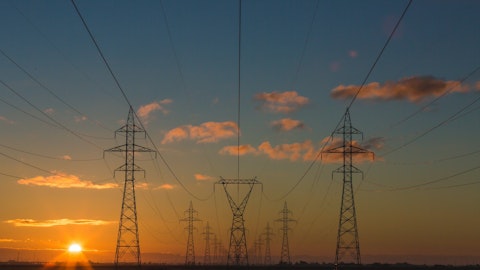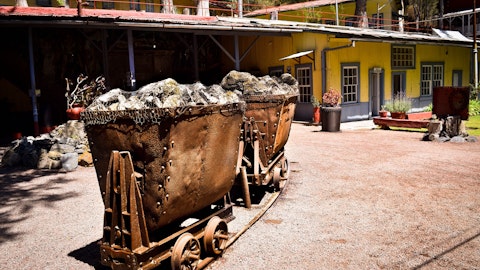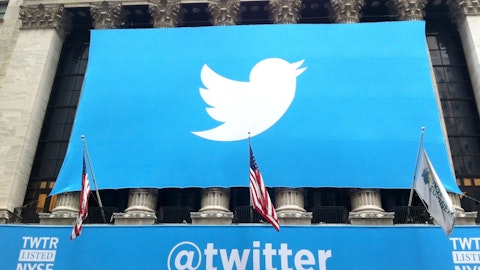In this article, we discuss 10 biggest investments in the Elon Musk portfolio. If you want to read about some investments in the Musk portfolio, go directly to Elon Musk’s Portfolio: 5 Biggest Investments.
Elon Musk is the richest man in the world with a personal net worth of over $270 billion. Musk owns a 17% stake in electric vehicle maker Tesla, Inc. (NASDAQ:TSLA) worth more than $140 billion. He is also the owner of prominent startups like SpaceX, Neuralink and The Boring Company. SpaceX is valued at over $100 billion, Neuralink is worth $1 billion, and The Boring Company is worth more than $5 billion. Musk became the richest person in the world in early 2021 and has held the title since.
Apart from being the CEO of Tesla, Inc. (NASDAQ:TSLA), Musk has also made huge investments in PayPal Holdings and Twitter, Inc. (NYSE:TWTR) over the years. Recently, he has been the subject of controversy after making a takeover bid for Twitter, Inc. (NYSE:TWTR) that experts around the world have dismissed as “arrogant” and “nonsensical”. For example, Jim Cramer, a former hedge fund manager and host of Mad Money on CNBC, noted in a recent interview that the Twitter, Inc. (NYSE:TWTR) board has “no choice but to reject” the offer made by Musk in light of their fiduciary responsibilities.
Early Life and Tesla Stardom
Musk was born in South Africa but moved to Canada for university education. From there, he transferred to the University of Pennsylvania, earning an undergraduate degree in physics and economics. He enrolled in a post-graduate program at Stanford University afterwards but deferred attendance in favor of his business activities. He launched Zip2, an online navigation service, before selling it and using the proceeds to fund another startup investment.
Musk became a big backer of Tesla, Inc. (NASDAQ:TSLA) in 2004 through a private investment. Later, he joined the company as a board member and was promoted to the CEO position in 2008. In the years since, he has also launched other billion-dollar startups like SpaceX and Neuralink. As the share price of the EV maker has soared in recent months, so has the personal fortune of Musk. In November 2021, as the EV maker topped $1 trillion in market capitalization, the personal wealth of Musk was estimated to be at $340 billion at one point.
Career Trajectory: $28,000 to $270 billion
Musk dropped out of Stanford in 1995 and started Zip2 with $28,000 in borrowed money from his father. Merely four years later, he had sold this firm in a deal worth $307 million to computer firm Compaq. Musk earned close to $22 million from the sale. Flush from success, Musk invested $10 million from this money into a new venture named X.com. This was merged with Confinity and later became PayPal. In 2002, eBay purchased PayPal. Musk made more than $100 million from this sale
In the following years, Musk invested at least $180 million into different startups. This included a $100 million investment in SpaceX, a $70 million investment in Tesla, and a $10 million investment in SolarCity. These have paid Musk incredible dividends in the past few years and he has climbed to the top of the wealth ladder. Naturally, his incredible wealth has attracted a lot of interest on Wall Street where market experts are studying his investment patterns in hopes of figuring out the winning formula.
Our Methodology
The companies listed below were picked from a careful assessment of the investment history of Elon Musk.

Elon Musk’s Portfolio: Biggest Investments
10. OpenAI
OpenAI is a research laboratory that focuses on artificial intelligence (AI). The firm, considered a competitor to DeepMind, an AI initiative of Google parent Alphabet, is based in San Francisco. Musk was one of the earliest funders of the company, pledging $1 billion to it when it was founded in 2015 alongside Sam Altman and Ilya Sutskever. In 2019, OpenAI received a $1 billion grant from tech giant Microsoft as well. Musk, who had served on the board of the firm since it was founded, resigned in 2018 but continues to play an advisory role at the firm.
Musk, while announcing his resignation, cited potential conflicts of interest as OpenAI and Tesla were both working on AI initiatives. Up until 2019, OpenAi had been a non-profit. After receiving the Microsoft funding, however, the firm turned the business model around and became a for-profit firm. It also announced the commercial licensing of the technologies it had developed. Elon Musk has publicly criticized the OpenAI deal with Microsoft, noting in a September 2020 tweet that OpenAI had been “captured” by Microsoft.
Just like PayPal Holdings, Inc. (NASDAQ:PYPL), Tesla, Inc. (NASDAQ:TSLA), and Twitter, Inc. (NYSE:TWTR), OpenAI is one of the firms on the radar of elite growth investors.
9. Dogecoin
Dogecoin is a cryptocurrency that started as a joke but has since gained mainstream recognition as celebrities like Elon Musk back it on social media. Musk has personally confirmed that he does own Dogecoin. In recent tweets, posted in context of Musk making a bid to take over social networking platform Twitter, the billionaire has teased the concept of introducing Dogecoin payments on Twitter as well. In January this year, Musk had revealed that Tesla merchandise was buyable via the meme coin as well.
Dogecoin has jumped in tandem with a series of tweets from Musk in the past few months. In July 2021, Musk tweeted about the problems associated with coins like Bitcoin and Ethereum and speculated that an update from Dogecoin that aimed to solve these issues, like lowering transaction times and costs, would give the currency an edge over other coins. Back in April 2021, a meme on Dogecoin had resulted in a huge surge in the price of the coin. During an appearance on popular show Saturday Night Live, Musk called the coin a “hustle”.
8. Bitcoin
Apart from Dogecoin, Musk has also admitted multiple times that he owns some Bitcoin, the most popular cryptocurrency in the world. Tesla, Inc. (NASDAQ:TSLA), the EV maker led by Musk, owns more than 43,000 Bitcoin, worth close to $2 billion. This is one of the largest institutional holdings of the coin in the United States. Despite a broad drop in the prices of the coin towards the backend of last year, Musk did not sell any of his stake in Bitcoin, per regulatory filings submitted by the EV maker to authorities in the US.
Speaking at The B Word conference in the summer of last year, Musk said he was committed to investing in cryptocurrencies in general but highlighted certain risks associated with owning Bitcoin. He stressed that the coin used the proof of work as a consensus mechanism that was “using energy that’s a bit too much and not necessarily good for the environment”. He clarified some of the controversy caused by his statements on the coin that caused the price to plummet, highlighting that he would “pump but not dump” the coin and wanted to see it succeed.
7. SolarCity
Musk agreed to purchase solar energy firm SolarCity in an all-stock deal worth $2.6 billion in 2016. Musk convinced the board of Tesla, Inc. (NASDAQ:TSLA) that the purchase was part of a larger plan to create vertical integration within Tesla that would help with energy generation and consumption. The deal has come under increased scrutiny in the past few years and Tesla, Inc. (NASDAQ:TSLA) shareholders and Musk are engaged in a court battle over it that could result in settlements worth $13 billion. Musk owned nearly 22% of Tesla and 21% of SolarCity when the deal was finalized.
Musk has denied any wrongdoing with regards to the SolarCity deal while Tesla, Inc. (NASDAQ:TSLA) shareholders allege that the deal benefited Musk and his close family and associated unfairly. Tesla shares have skyrocketed since the deal. At the time, the share price of the EV maker stood at $43.92. It has now climbed above $1,000 per share, up 1,500% in the past five years. SolarCity was founded by Lyndon and Peter Rive, both of whom are cousins of Musk. Musk served as the chairman of the board of the company at the time of the acquisition.
6. The Boring Company
The Boring Company is a firm that aims to provide a solution to traffic woes by building a network of underground tunnels. The company is headquartered in Pflugerville. It recently announced that it had raised over $675 million at a Series C funding round that values the company at more than $5.5 billion. Musk tweeted about it on April 21, noting that the firm was looking to hire “amazing people” and scale up boring machine production. He added that the firm wanted to build “thousands of miles of tunnels”.
The Boring Company, founded by Musk, has also recently announced that it had won approval for building a 29-mile tunnel network connecting 51 stations under Las Vegas. The network will be capable of transporting 57,000 passengers per hour and has been labeled the “largest subsurface transportation project” ever by the firm. The Boring Company aims to transport passengers at speeds of up to 150 miles an hour. So far, the company has only been able to reach speeds of around 50 miles per hour.
In addition to PayPal Holdings, Inc. (NASDAQ:PYPL), Tesla, Inc. (NASDAQ:TSLA), and Twitter, Inc. (NYSE:TWTR), The Boring Company is one of the firms that hedge funds are monitoring as a potential growth investment.
Click to continue reading and see Elon Musk’s Portfolio: 5 Biggest Investments.
Suggested Articles:
- 10 Financial Services Dividend Stocks with Over 4% Yield
- 15 Best Momentum Stocks To Invest In
- 10 Cheap Hemp Stocks Redditors are Buying
Disclosure. None. Elon Musk’s Portfolio: 10 Biggest Investments is originally published on Insider Monkey.




